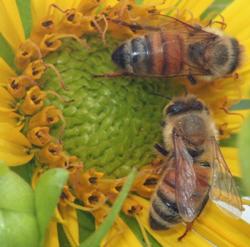 The U.S. Department of Agriculture (USDA) and the U.S. Environmental Protection Agency (EPA) today released a comprehensive scientific report on honey bee health. The report states that there are multiple factors playing a role in honey bee colony declines, including parasites and disease, genetics, poor nutrition and pesticide exposure.
The U.S. Department of Agriculture (USDA) and the U.S. Environmental Protection Agency (EPA) today released a comprehensive scientific report on honey bee health. The report states that there are multiple factors playing a role in honey bee colony declines, including parasites and disease, genetics, poor nutrition and pesticide exposure.
“The challenges are complex and there is no smoking gun,” said Sonny Ramaswamy, Administrator of USDA’s National Institute of Food and Agriculture. “It is imperative that we take action to address the factors contributing to the decline in honey bees and the continuing impact that our farmers and honeybee producers are facing as well.”
“It’s a critical issue that affects virtually every American,” said Acting EPA Administrator Bob Perciasepe. “The report we’ve released today is the product of unprecedented collaboration, and our work in concert must continue. As the report makes clear, we’ve made significant progress, but there is still much work to be done to protect the honey bee population.”
When it comes to the issue of pesticide exposure, the report says that more research is needed. Other countries are moving to ban the neonicotinoids class of insecticides over fears that they are the cause of the honey bee decline. Asked why the United States doesn’t just ban the pesticide, “We let science drive the outcome of our decision-making,” said Jim Jones with the EPA Office of Chemical Safety and Pollution Prevention. “There are non-trivial costs to society if we get this wrong. These are products that not only provide meaningful benefits to the farmers who use them, but they then generate benefits to consumers as well for affordable in the United States and they also are compounds that, as a general matter for human health and the environment, are preferable to the alternative.”
A press conference featuring government officials and stakeholders in the honey bee industry was held to explain the report’s findings. In addition to Ramaswamy and Perciasepe, those on the call included:
Dr. May Berenbaum, University of Illinois Urbana-Champaign
Zac Browning, Beekeeper
Steve Bradbury, EPA Office of Chemical Safety and Pollution Prevention
Dr. Jeffery Pettis, Bee Research Lead, USDA Agricultural Research Service
